牛津上海版英语九年级上册课件:Unit 5 The human brain Grammar(共23张PPT)
文档属性
| 名称 | 牛津上海版英语九年级上册课件:Unit 5 The human brain Grammar(共23张PPT) | 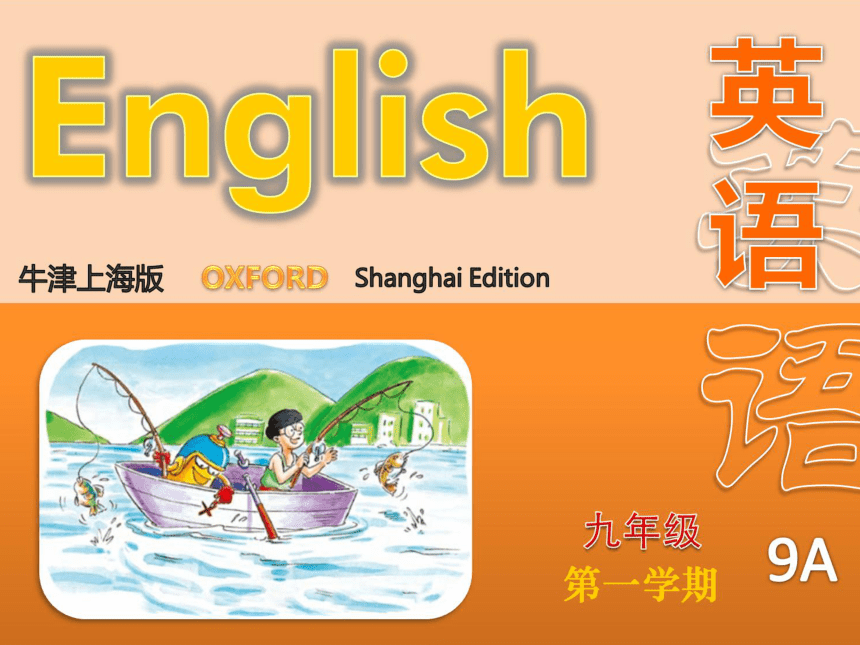 | |
| 格式 | zip | ||
| 文件大小 | 17.7MB | ||
| 资源类型 | 教案 | ||
| 版本资源 | 牛津上海版(试用本) | ||
| 科目 | 英语 | ||
| 更新时间 | 2016-06-19 17:42:01 | ||
图片预览

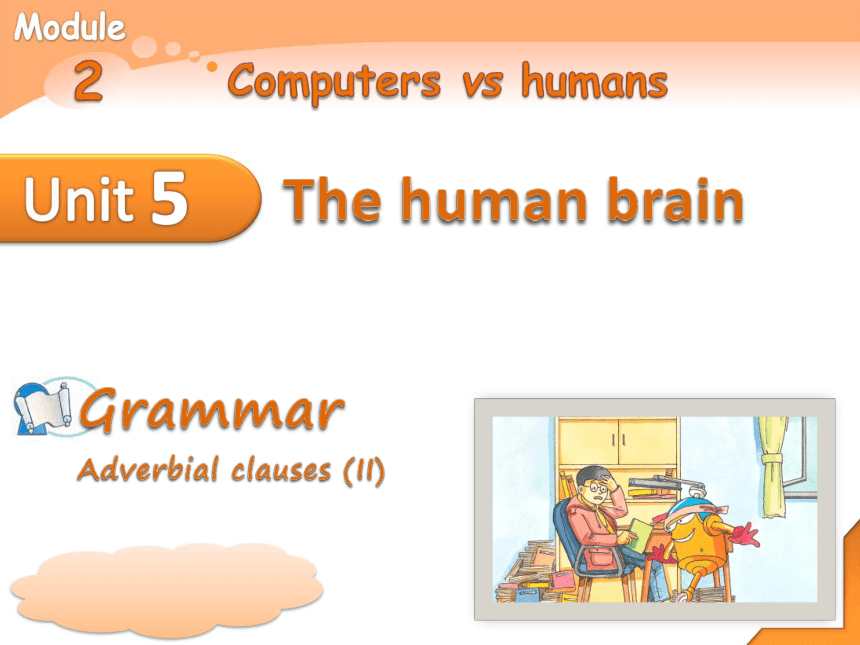
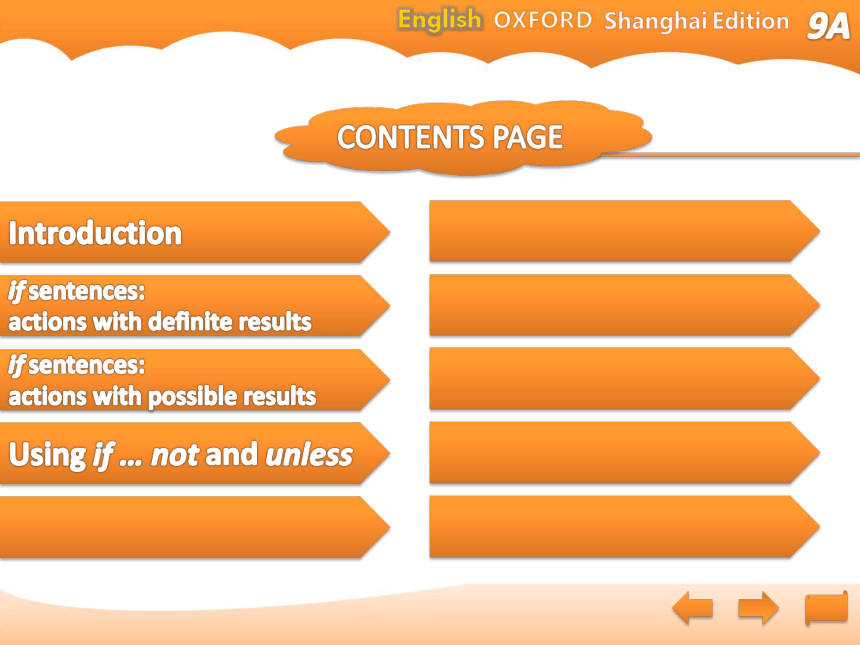
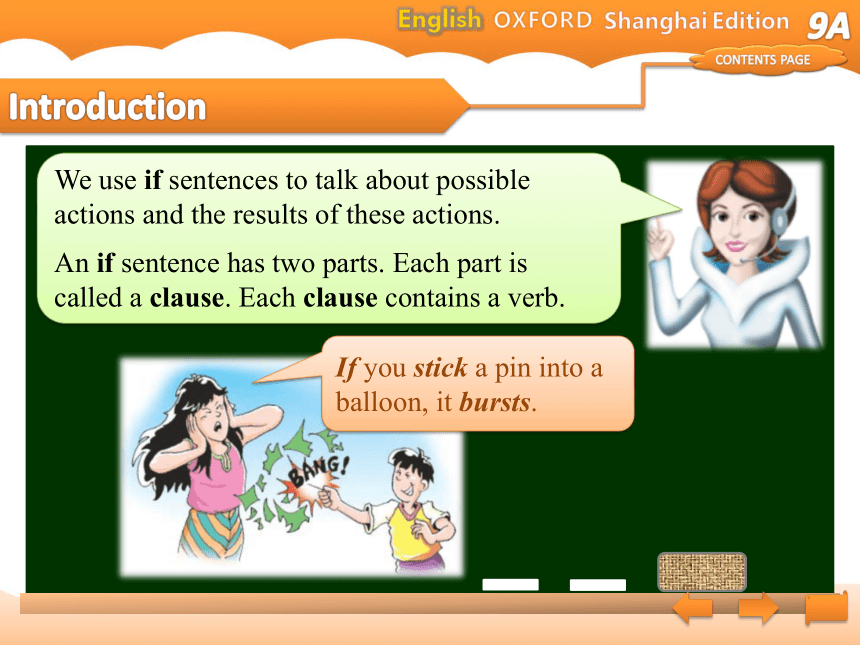
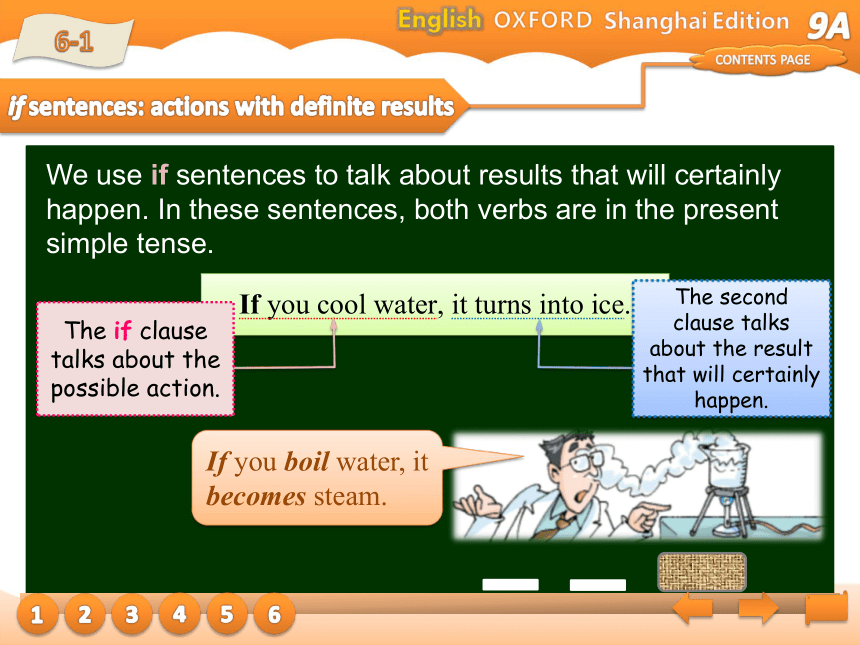
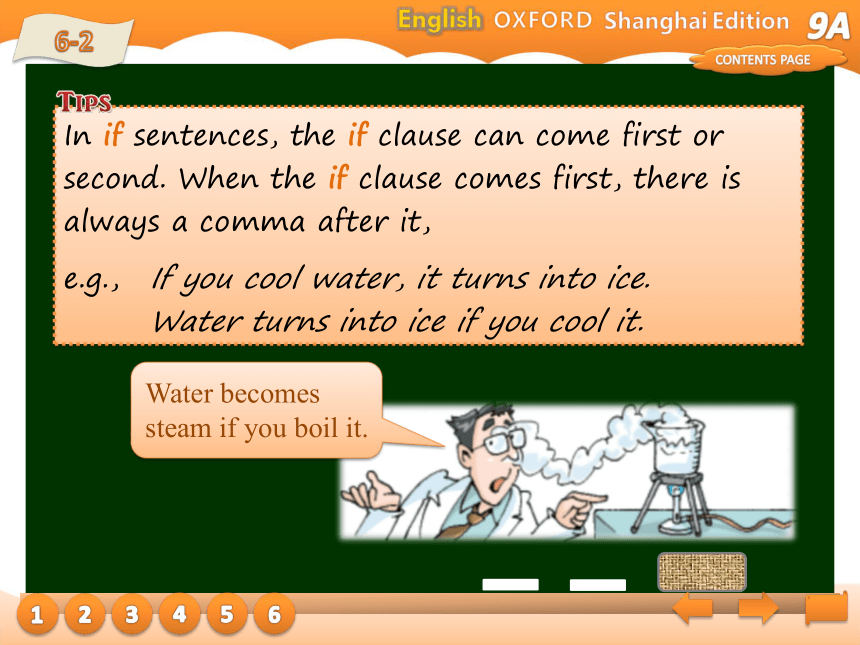
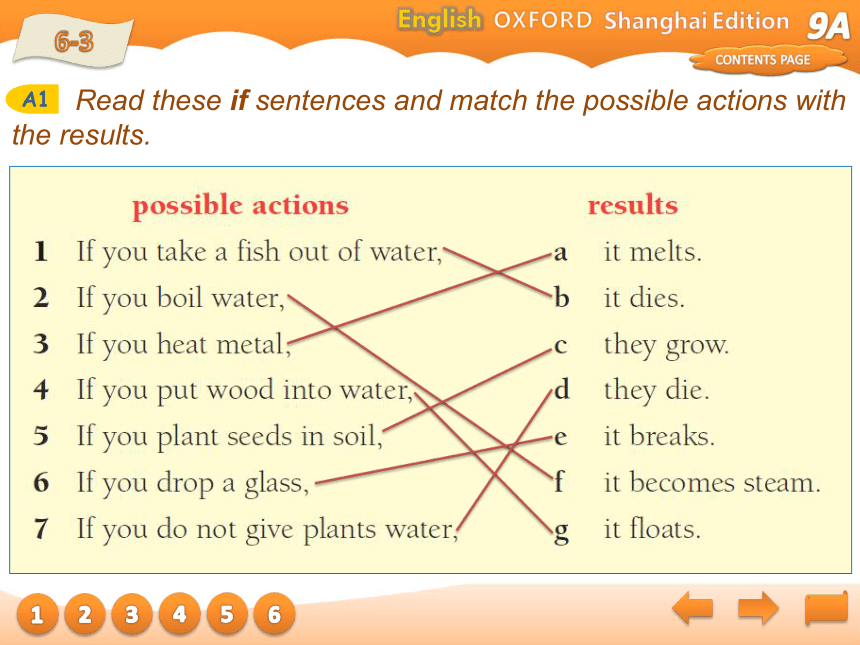
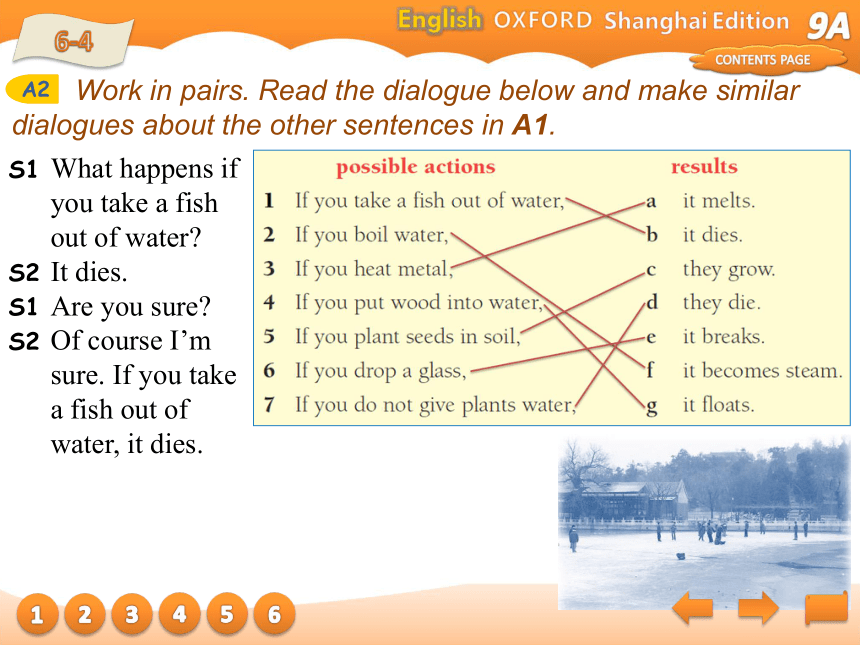
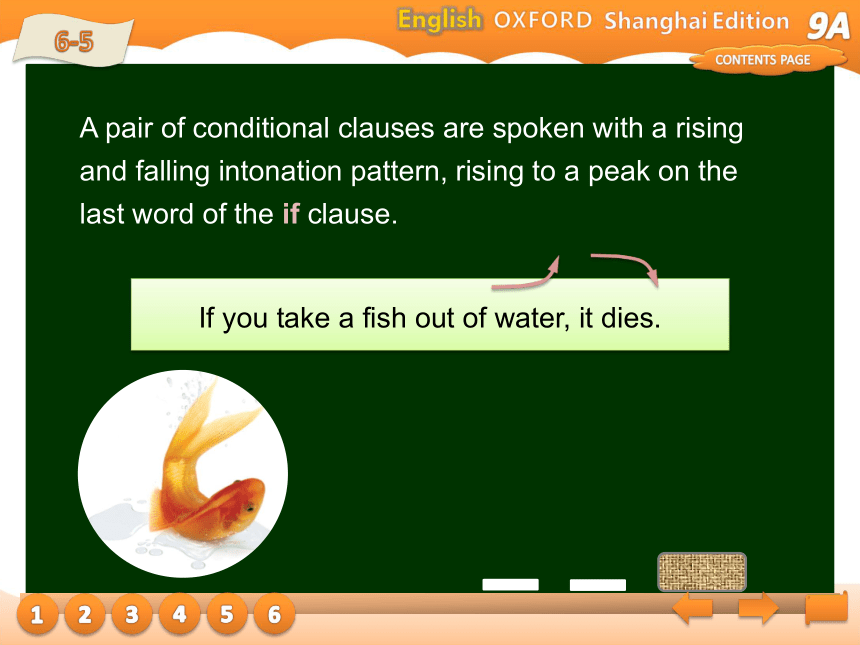
文档简介
课件23张PPT。Grammar
Adverbial clauses (II)2Computers vs humans5The human brainCONTENTS PAGEIntroductionif sentences: actions with definite resultsif sentences:
actions with possible resultsUsing if … not and unlessIntroductionWe use if sentences to talk about possible actions and the results of these actions.
An if sentence has two parts. Each part is called a clause. Each clause contains a verb.If you stick a pin into a balloon, it bursts.if sentences: actions with definite results6-1123We use if sentences to talk about results that will certainly happen. In these sentences, both verbs are in the present simple tense.If you cool water, it turns into ice.If you boil water, it becomes steam.4566-2123In if sentences, the if clause can come first or second. When the if clause comes first, there is always a comma after it,
e.g., If you cool water, it turns into ice.
Water turns into ice if you cool it.Water becomes steam if you boil it.456 Read these if sentences and match the possible actions with the results.A16-3123456 Work in pairs. Read the dialogue below and make similar dialogues about the other sentences in A1.A26-4123S1 What happens if you take a fish out of water?
S2 It dies.
S1 Are you sure?
S2 Of course I’m sure. If you take a fish out of water, it dies.4566-5123A pair of conditional clauses are spoken with a rising and falling intonation pattern, rising to a peak on the last word of the if clause.If you take a fish out of water, it dies.456 Complete these sentences with the words in brackets.A36-6123A balloon ________________________________________ it. (a pin/if/stick/you/bursts/into)
Metal ___________________________________________ it. (you/heat/melts/if)
Wood ________________________________________ water. (you/into/put/if/floats/it)
A glass __________________________________________ it. (drop/you/breaks/if)bursts if you stick a pin intomelts if you heatfloats if you put it intobreaks if you drop456if sentences: actions with possible results7-11234We also use if sentences to talk about results that will probably happen. In these sentences, the verb tenses are different. The verb in the if clause (first clause) is in the simple present tense. The verb in the second clause is in the simple future tense.If I invent a kind of special brain food, everybody will buy it.567Read the following examples:7-21234If you use the link method, you will improve your memory.You will remember things better if the pictures in your mind are silly, strange and colourful.567 William’s mum is giving him advice about his problems. Choose the correct half-sentences from the boxes to complete her advice for him.B17-31234I sometimes take the wrong books to school.
I was away from school today. I don’t know what to do for homework.
I hate getting up! I always feel tired in the mornings.
I don’t know what this word means.
The link method doesn’t help me much. I forget the pictures in my mind.William’s problems:Mum’s advice:If you go to bed earlier,
If you telephone your friends,
If you check your timetable every night,
If you look it up in the dictionary,
If you think about each picture for 10 to 20 seconds,you won’t feel tired in the mornings.
it will stay in your mind better.
they will tell you what homework to do.
you’ll find out its meaning.
you will know which books to take.5677-41234I sometimes take the wrong books to school.
I was away from school today. I don’t know what to do for homework.
I hate getting up! I always feel tired in the mornings.
I don’t know what this word means.
The link method doesn’t help me much. I forget the pictures in my mind.William’s problems:If you check your timetable every night, you will know which books to take.If you telephone your friends, they will tell you what homework to do.If you go to bed earlier, you won’t feel tired in the mornings.If you look it up in the dictionary, you’ll find out its meanings.If you think about each picture for 10 to 20 seconds, it will stay in your mind better.567 Carol is giving advice to Henry. What is she saying? Use the pictures and the words in brackets to help you.B27-5123412______________ the wheel round, it _____________________ more easily. (make/turn)The seeds ___________________ ___________________ in the soil. (grow/plant)If you makewill turnwill grow if youplant them567______________ another wing, it ______________. (put on/fly)
______________ your jumper, you ______________ so cold. (put on/not feel)
The meat _______________________________ in the fridge. (not go bad/put)
You __________________________ your glasses. (see better/wear)If you put onwill flyIf you put onwill not feelwill not go bad if you put itwill see better if you wear7-612343456567 We often use the probable conditional when we are stating plans. Imagine you are planning an outing, and then complete these if clauses in different ways.B37-71234567The word unless means if … not. For example, these sentences have the same meaning:Using if … not and unless4-11234If you do not keep ice cream in a freezer, it melts.4-21234Unless or if … not can be used as a first clause.Unless or if … not can also be used as a second clause. Join the following sentences with if ... not.C14-31234you improve your handwriting/you will lose marks in the exam
you will get toothache/you clean your teeth regularly
this room will get very hot/you put the air conditioning on soon
you understand this exercise/please put up your hand
you close that window/lots of mosquitoes will get in
the waiter comes soon/I shall leave this restaurantIf you do not improve your handwriting, you will lose marks in the exam.You will get toothache if you do not clean your teeth regularly.This room will get very hot if you do not put the air conditioning on soon.If you do not understand this exercise, please put up your hand.If you do not close that window, lots of mosquitoes will get in.If the waiter does not come soon, I shall leave this restaurant. Match the beginnings of the sentences in Column A with the endings in Column B.C24-41234ConsolidationWorkbook 9A, pages 38, 39, 40 and 41.
说 明
本册教材根据上海市中小学(幼儿园)课程改革委员会制订的课程方案和《上海市中小学英语课程标准(征求意见稿)》编写,供九年义务教育九年级第一学期试用。
本教材经上海市中小学教材审查委员会审查准予试用。
《英语(牛津上海版)》(试用本)
主 编:沃振华
原 作 者:P Etherton G McArthur P Leetch
改编人员:沃振华 朱维庭 李绍贤 施安吉 施志红
奚翠华 卢 璐 张 瑶
牛津大学出版社(中国)有限公司英语教材编写委员会
责任编辑:马芳芳 林 妍
插 图:K Y Chan 周允达
课件制作:卢 璐
支持学校:上海市市北初级中学
Adverbial clauses (II)2Computers vs humans5The human brainCONTENTS PAGEIntroductionif sentences: actions with definite resultsif sentences:
actions with possible resultsUsing if … not and unlessIntroductionWe use if sentences to talk about possible actions and the results of these actions.
An if sentence has two parts. Each part is called a clause. Each clause contains a verb.If you stick a pin into a balloon, it bursts.if sentences: actions with definite results6-1123We use if sentences to talk about results that will certainly happen. In these sentences, both verbs are in the present simple tense.If you cool water, it turns into ice.If you boil water, it becomes steam.4566-2123In if sentences, the if clause can come first or second. When the if clause comes first, there is always a comma after it,
e.g., If you cool water, it turns into ice.
Water turns into ice if you cool it.Water becomes steam if you boil it.456 Read these if sentences and match the possible actions with the results.A16-3123456 Work in pairs. Read the dialogue below and make similar dialogues about the other sentences in A1.A26-4123S1 What happens if you take a fish out of water?
S2 It dies.
S1 Are you sure?
S2 Of course I’m sure. If you take a fish out of water, it dies.4566-5123A pair of conditional clauses are spoken with a rising and falling intonation pattern, rising to a peak on the last word of the if clause.If you take a fish out of water, it dies.456 Complete these sentences with the words in brackets.A36-6123A balloon ________________________________________ it. (a pin/if/stick/you/bursts/into)
Metal ___________________________________________ it. (you/heat/melts/if)
Wood ________________________________________ water. (you/into/put/if/floats/it)
A glass __________________________________________ it. (drop/you/breaks/if)bursts if you stick a pin intomelts if you heatfloats if you put it intobreaks if you drop456if sentences: actions with possible results7-11234We also use if sentences to talk about results that will probably happen. In these sentences, the verb tenses are different. The verb in the if clause (first clause) is in the simple present tense. The verb in the second clause is in the simple future tense.If I invent a kind of special brain food, everybody will buy it.567Read the following examples:7-21234If you use the link method, you will improve your memory.You will remember things better if the pictures in your mind are silly, strange and colourful.567 William’s mum is giving him advice about his problems. Choose the correct half-sentences from the boxes to complete her advice for him.B17-31234I sometimes take the wrong books to school.
I was away from school today. I don’t know what to do for homework.
I hate getting up! I always feel tired in the mornings.
I don’t know what this word means.
The link method doesn’t help me much. I forget the pictures in my mind.William’s problems:Mum’s advice:If you go to bed earlier,
If you telephone your friends,
If you check your timetable every night,
If you look it up in the dictionary,
If you think about each picture for 10 to 20 seconds,you won’t feel tired in the mornings.
it will stay in your mind better.
they will tell you what homework to do.
you’ll find out its meaning.
you will know which books to take.5677-41234I sometimes take the wrong books to school.
I was away from school today. I don’t know what to do for homework.
I hate getting up! I always feel tired in the mornings.
I don’t know what this word means.
The link method doesn’t help me much. I forget the pictures in my mind.William’s problems:If you check your timetable every night, you will know which books to take.If you telephone your friends, they will tell you what homework to do.If you go to bed earlier, you won’t feel tired in the mornings.If you look it up in the dictionary, you’ll find out its meanings.If you think about each picture for 10 to 20 seconds, it will stay in your mind better.567 Carol is giving advice to Henry. What is she saying? Use the pictures and the words in brackets to help you.B27-5123412______________ the wheel round, it _____________________ more easily. (make/turn)The seeds ___________________ ___________________ in the soil. (grow/plant)If you makewill turnwill grow if youplant them567______________ another wing, it ______________. (put on/fly)
______________ your jumper, you ______________ so cold. (put on/not feel)
The meat _______________________________ in the fridge. (not go bad/put)
You __________________________ your glasses. (see better/wear)If you put onwill flyIf you put onwill not feelwill not go bad if you put itwill see better if you wear7-612343456567 We often use the probable conditional when we are stating plans. Imagine you are planning an outing, and then complete these if clauses in different ways.B37-71234567The word unless means if … not. For example, these sentences have the same meaning:Using if … not and unless4-11234If you do not keep ice cream in a freezer, it melts.4-21234Unless or if … not can be used as a first clause.Unless or if … not can also be used as a second clause. Join the following sentences with if ... not.C14-31234you improve your handwriting/you will lose marks in the exam
you will get toothache/you clean your teeth regularly
this room will get very hot/you put the air conditioning on soon
you understand this exercise/please put up your hand
you close that window/lots of mosquitoes will get in
the waiter comes soon/I shall leave this restaurantIf you do not improve your handwriting, you will lose marks in the exam.You will get toothache if you do not clean your teeth regularly.This room will get very hot if you do not put the air conditioning on soon.If you do not understand this exercise, please put up your hand.If you do not close that window, lots of mosquitoes will get in.If the waiter does not come soon, I shall leave this restaurant. Match the beginnings of the sentences in Column A with the endings in Column B.C24-41234ConsolidationWorkbook 9A, pages 38, 39, 40 and 41.
说 明
本册教材根据上海市中小学(幼儿园)课程改革委员会制订的课程方案和《上海市中小学英语课程标准(征求意见稿)》编写,供九年义务教育九年级第一学期试用。
本教材经上海市中小学教材审查委员会审查准予试用。
《英语(牛津上海版)》(试用本)
主 编:沃振华
原 作 者:P Etherton G McArthur P Leetch
改编人员:沃振华 朱维庭 李绍贤 施安吉 施志红
奚翠华 卢 璐 张 瑶
牛津大学出版社(中国)有限公司英语教材编写委员会
责任编辑:马芳芳 林 妍
插 图:K Y Chan 周允达
课件制作:卢 璐
支持学校:上海市市北初级中学
